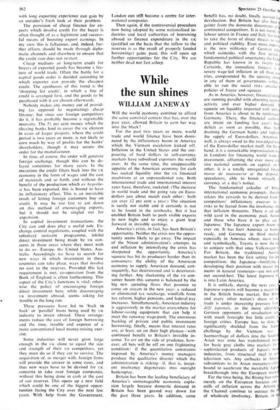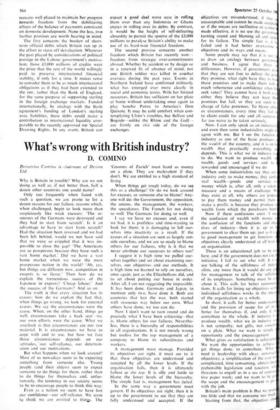While the sun shines
WILLIAM JANE WAY
Will the world economy continue to afford the same convivial context that has, over the past year, allowed Britain to earn her way into the black?
For the past two years or more, world trade and world finance have been domi- nated by the inflationary boom in America which the Vietnam escalation kicked off. Inflation in the United States and the out- pouring of hard dollars to soft-currency markets have subsidised exporters the world over. At the same time, the unappeasable appetite of the American economy for cash has sucked liquidity into the us financial maelstrom at an unprecedented rate. Both international trade and international interest rates have, therefore, rocketed. (The increase in world trade and the going rate on Euro- dollars just about match each other: both are over 12 per cent a year.) The situation is surely not stable and it certainly is not to be found in the textbooks. But it has enabled Britain both to push visible exports to new highs and to enjoy a giant leap forward in invisible earnings.
America's crisis, in fact, has been Britain's opportunity. Neither the crisis nor the oppor- tunity seems likely to go away. The impact of the Nixon administration's attempts to end inflation by intensifying the crisis has sharpened the opportunity. America's squeeze has hit its producers harder than its consumers; the ability of the American economy to supply American demand, con- sequently, has deteriorated and is deteriorat- ing further. Any slackening of the us con- sumer boom this autumn is balanced by the big new spending flows that promise to come on stream in the new year: a reduced or eliminated tax surcharge, windfalls from tax reform, higher pensions, and federal pay increases. Simultaneously, American industry is aggressively in the market everywhere for labour-saving equipment that can help it meet the runaway wage-push. The enormous backlog of private and public investment borrowing, finally, means that interest rates are, at least, set on their high plateau—with continued benefit to Britain's invisible in- come. To err on the side of prudence, how- ever, all bets will be off on one frightening condition: if the quantitative constraints imposed by America's money managers produce the qualitative disaster which the administration is risking—if, that is, incipi- ent insolvency degenerates into outright bankruptcy.
Britain has been the leading beneficiary of America's unmanageable economic explo- sion largely because domestic demand in Britain has been geared way down for the past three years. In addition, some benefit has, no doubt, finally accrued fr devaluation. But Britain has also been gainer from the domestic discontents of continental competitors. It is not merel% labour unrest in France and Italy has t.e to take the form of direct threats to so, and political stability. Even more import, is the new militancy of German la which coincides with the first period fundamental political uncertainty the Fede Republic has known in its twenty lea Certainly, the immediate forecast is severe wage-led inflation in all three co tries, compounded by the seeming abse in any of them of governments willine able to run the social risks entailed policies of freeze and squeeze.
As in America, however, financial dan are running parallel with churning econo activity and ever higher demand. squeeze on liquidity imported with inflat. from America is about to be reinforced Germany. There, the financial authort are intent on funding last year's bud deficit as soon as possible, thus fun draining the German banks and tightm. the supply of Euro-dollars. Attention, well, is always owed to the two-edged mg of the Euro-dollar market itself. On the hand, it is a remarkable improvisation (ma in London) for financing world trade investment, offsetting the ever more es sive national controls on capital: on other, it is a totally unregulated fina masse de manoeuvre at the disposal speculators, able to bomb virtuall) currency at a day's notice.
The fundamental calculus of Brita. international economic prospects. there( relates the rewards to be derived from competitors' inflationary excesses to risks to be feared from the insolvency wh that inflation threatens. There is an a wild card in the economic pack. hossel and those who have it to play are Japanese. The Japanese export boom r ever on. It has hurt America at home ready, and Germany in third marke especially in America where, most nal and symbolically, Toyota is now the na to conjure with that once Volkswagen u For Britain, the traditional Austral. market has been the first setting for di competition; the Japanese—fortifying developing their position with major in, ments in natural resources—are not co out second-best. The latest Japanese is into Latin America.
It is unlikely, during the next year. Japanese exports will become a major fa in the British home market. But Bit and every other nation's share of V. trade is under increasing pressure from deli japonais, as the more clear-h German opponents of revaluation ar with much foresight but little credit f foreign critics. Europe has, to date. significantly shielded from the JaPa challenge by the Vietnam war. haemorrhage of dollars into the South- Asian war zone has transformed mar for basic grey cloths into markets for sophisticated products of Japan's m industries, from structural steel to ca television sets. Any cutbacks in Ame subventions to its Asian mercenar),-alli bound to accelerate the inevitable Jap breakthrough into the European marke For the time being, the Rising Sun re merely on the European horizon and mills of inflation across the Atlantic the Channel continue to outrace the of wholesale insolvency. Britain, in
remains well placed to maintain her progress towards freedom from the debilitating effects of the balance of payments constraint on domestic development. None the less, two further provisos are worth bearing in mind.
The first concerns the burden of short- term official debts which Britain ran up in the effort to stave off devaluation. Whatever the part played by considerations of political prestige in the Labour government's motiva- tion, those 0,000 millions of credits were the price that the rest of the world willingly pa id to preserve international financial stability, if only for a time. It makes sense to consider them to be as much international obligations as if they had been extended to the IMF, rather than the Bank of England, for the same purpose of supporting sterling in the foreign exchange markets. Funded internationally, by analogy with the Basle agreement's funding of London's sterling area liabilities, these debts could make a contribution to international liquidity com- parable to the recently approved IMF Special Drawing Rights. In any event. Britain can expect a good deal more ease in rolling them over than any Indonesia or Ghana enjoys in rolling over its debts. By contrast, it would be the height of self-defeating absurdity to permit the spectre of the £3,000 millions to paralyse Britain's ability to make use of its hard-won financial freedom.
The second proviso concerns another freedom which Britain has recently won— freedom from strategic over-commitments abroad. Whether by accident or by design or in a renewed fit of absence of mind, not one British soldier was killed in combat overseas during the past year. Events in Northern Ireland have confirmed militarily what has emerged ever more clearly in social and economic terms. With her limited resources, Britain has sufficient on her plate at home without undertaking once again to play Sancho Panza to America's Don Quixote. It may be cold comfort when con- templating Ulster's troubles, but Belfast and Bogside—unlike the Rhine and the Gulf— are firmly on this side of the foreign exchanges.



















































 Previous page
Previous page